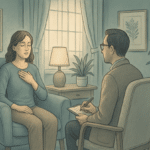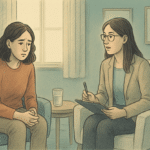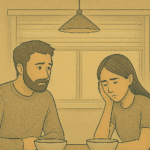Healing From Domestic Abuse: Signs and Support Options

You found someone and thought they were “it” – your person. You let them into your life; they may have met your family and friends or supported you through hard times. You trusted them and believed they’d never hurt you.
But then, the relationship changed. It may have been gradual, or it could have happened after a big event, like an argument. You noticed your partner’s behavior began to change. They became more controlling or manipulative, and they may have become abusive.
If this sounds like your story, know that it isn’t your fault, and you’re not alone. Around 10 million Americans experience violence in their relationship every single year. One in four women. One in nine men.1
When a relationship turns abusive, it can feel like there’s no way out or way to recover from it. But please know that there is support available to help you heal. Below, we will talk through:
- What domestic abuse is
- The signs of domestic abuse in a relationship
- How domestic abuse can impact your life
- Treatment for domestic abuse survivors

What Is Domestic Abuse?
Domestic abuse, or domestic violence (DV), is a pattern of behaviors in which one person – often a romantic partner – attempts to maintain power or control over their spouse.
When we first hear the term “domestic abuse,” many people imagine a woman, and they may picture physical violence, with a man as the perpetrator. While this can, of course, be the case, domestic abuse can affect people of all genders and take many different forms, such as:
- Stalking
- Harassment
- Online abuse
- Sexual abuse
- Financial abuse
- Coercive control
- Psychological aggression
What’s more, despite common belief, domestic abuse isn’t solely related to romantic relationships. Domestic abuse can also relate to:
- A parent abusing their child or vice versa
- Physical, emotional, or financial abuse between siblings
- Mistreatment of older adults by family members or caregivers
- Abuse between people who share a home, even if they aren’t related
Signs of Domestic Abuse in Adults
Due to the varied nature of domestic abuse, it can be difficult to pin down exact signs. After all, each instance of domestic abuse is unique. However, by looking at many DV cases, experts have found certain signs to help people identify domestic violence:
Emotional Indicators of Domestic Abuse2,3
A domestic abuse survivor may:
- Experience symptoms of depression, anxiety, or PTSD
- Constantly feel fearful or on edge
- Be isolated from their friends or family
- Feel helpless and hopeless, not knowing what to do
- Apologize excessively, even about small things
- Find it difficult to make decisions or express their opinion
In terms of the abuser, a key emotional indicator of domestic abuse is jealousy. This may result in them isolating the other person, checking their phone, or being generally controlling.
Physical Signs of Domestic Abuse2,3
A domestic abuse survivor might:
- Flinch or not want to be physically touched
- Have unhealthy eating habits or an eating disorder
- Show signs of stress-related health issues (e.g., stomach aches, headaches, or constant fatigue)
- Experience difficulties sleeping
- Have frequent injuries with inconsistent or vague explanations
- Have unexplained bruises, cuts, burns, or other injuries
Behavioral Indicators of Domestic Abuse2,3
A domestic abuse survivor may show the following behavioral signs:
- Withdrawal from social gatherings and loved ones
- Financial difficulties or a seeming lack of access to money
- Checking in constantly with the abuser or seeking approval
- Suddenly canceling plans or making excuses to their friends or family members
- Appearing nervous or overly eager to please the abuser
- Hesitation or inconsistency when talking about injuries
- Loss of interest in activities they used to enjoy
Behavioral signs of domestic abuse in the abuser may be:
- Controlling behavior
- Preventing a partner or spouse from having contact with friends or family.
- Frequent put-downs or name-calling
- Coercing a partner to dress in a sexual way
- Physical violence, such as slapping, hair-pulling, throwing objects at a spouse, or using weapons.
- Forcing sexual activity
It’s important to note that every abuser and domestic abuse survivor will show different signs. This is by no means a comprehensive list, it’s just giving you an idea of some of the ways domestic abuse may manifest.
The Impact of Domestic Abuse
Domestic abuse can have a significant impact on a person’s life, both when they’re in the relationship, and for a long while afterward. In the short term, domestic abuse can lead to physical injuries and pain which, in extreme cases, can affect long-term health.
Long-term, domestic abuse can have emotional and physical implications:
Emotional Impact of Domestic Abuse4
Domestic abuse can have a profound effect on a person’s mental health. While it’s not possible to say whether domestic abuse causes mental health difficulties definitively, research highlights a strong association between cases of DV and the following mental health conditions:
- Compulsive/obsessive behaviors
- Suicide
- Depression
- Anxiety
- PTSD
Physical Impact of Domestic Abuse4
Domestic violence can also have a longstanding impact on a person’s physical health. These often tie in with the mental health effects, but can also be a direct result of physical violence within the relationship. The potential physical implications of being in a violent relationship include:
- Headaches
- Insomnia
- Physical pain
- Chest pain
- Back pain
- Pelvic pain
- Traumatic brain injury
So, it’s clear that domestic abuse takes a toll on a person, not just in the short term but for many years afterward. If you or someone you know has experienced domestic abuse, know that you are not alone, and you don’t have to struggle in silence. Many treatment options are available to help you start to recover.
Treatment for Domestic Abuse Survivors at Mission Connection
The first step when trying to escape a situation involving domestic violence is to recognize you’re in it. Once you have, you can take steps to take care of yourself.
Therapy Options for Domestic Violence Victims
Some of the most effective forms of therapy we offer for domestic violence victims at Mission Connection are:
- Trauma-Focused Therapy for Domestic Violence: Studies show that trauma-focused therapy can help those who experienced trauma such as domestic violence.5 This form of talk therapy can help you understand and process your feelings, come to terms with your experience, and learn new coping strategies to live a healthy, happy life.
- Cognitive Behavioral Therapy (CBT) for Domestic Abuse: CBT is also highly effective at reducing the physical and emotional impact of domestic abuse.6 This approach is a goal-directed therapy technique, whereby one of our experienced therapists will work with you to identify a goal, and you will work towards this in your sessions.
- Group Therapy for Domestic Violence Survivors: Many people struggle with the idea of group therapy, especially when they feel vulnerable as many do after experiencing domestic violence. However, group therapy can offer a safe space to connect with other people who have had similar experiences, which can help you feel less alone. It can also give you a place to process and understand your experiences and feelings, with the support of others and a trained therapist.7
- Online Therapy for Domestic Abuse: We know how difficult it can be to leave your safe place after experiencing domestic abuse. That’s why we have adapted our services to include online talk therapy, with licensed therapists specialized in providing mental health support online. This means you can get access to top-quality, compassionate care in the comfort of your own home.
- Eye Movement Desensitization Reprocessing (EMDR) Therapy: At Mission Connection, EMDR involves using eye movement techniques to process and understand past traumatic experiences. EMDR has proven highly effective for survivors of domestic violence. Not only can it decrease symptoms of depression, but it can also increase confidence and hope. What’s more, it can help you come to terms with your experiences and move past these.8
These are just five of the many forms of therapy we have on offer. If you want to know more about the services we offer, get in contact.

Seek Support for Domestic Abuse Today
If you have experienced domestic abuse, we want you to know one thing more than anything else: you are not alone, and it is not your fault. Traumatic experiences, and especially domestic abuse, have a way of lodging themselves in us and making us believe that we are to blame, or that we have something to feel guilty about. But this is not the case.
You deserve to recover, and you deserve to get the support you need. At Mission Connection, it is our focus to give people just like you compassionate support that’s tailored to their needs.
For this reason, we offer a range of treatment options, including intensive outpatient treatment as well as residential and short-term inpatient care. This can really help if you’re trying to get back on your feet after experiencing domestic abuse. Our facilities and support services can be a springboard to get your life back on track.
If you want to know more about our services or find out how you can start therapy with Mission Connection, get in contact with us at 866-720-3165. We are here for you.
References
- Huecker, M. R., King, K. C., Jordan, G. A., & Smock, W. (2023). Domestic Violence. In StatPearls. StatPearls Publishing.
- NHS. (2022, December 30). Domestic violence and abuse. https://www.nhs.uk/live-well/getting-help-for-domestic-violence/
- National Centre for Domestic Violence. (n.d.). Signs of Domestic Abuse & Violence. https://www.ncdv.org.uk/signs-of-domestic-abuse-violence/
- Women’s Aid. (n.d.). The impact of domestic abuse. https://www.womensaid.org.uk/information-support/what-is-domestic-abuse/the-impact-of-domestic-abuse/
- Gonçalves, M., Martinho, G., & Ghafoori, B. (2024). Trauma-focused treatments for victims of interpersonal violence: A comparison of treatment interventions and outcomes. Psychotherapy Research, 1–14. https://doi.org/10.1080/10503307.2024.2353890
- Tirado-Muñoz, J., Gilchrist, G., Farré, M., Hegarty, K., & Torrens, M. (2014). The efficacy of cognitive behavioural therapy and advocacy interventions for women who have experienced intimate partner violence: A systematic review and meta-analysis. Annals of Medicine, 46(8), 567–586. https://doi.org/10.3109/07853890.2014.941918
- Crespo, M., Arinero, M., & Soberón, C. (2021). Analysis of effectiveness of individual and group Trauma-Focused interventions for female victims of intimate partner violence. International Journal of Environmental Research and Public Health, 18(4), 1952. https://doi.org/10.3390/ijerph18041952
- Schwarz, J. E., Baber, D., Barter, A., & Dorfman, K. (2019). A Mixed methods evaluation of EMDR for treating female survivors of sexual and domestic violence. Counseling Outcome Research and Evaluation, 11(1), 4–18. https://doi.org/10.1080/21501378.2018.1561146






